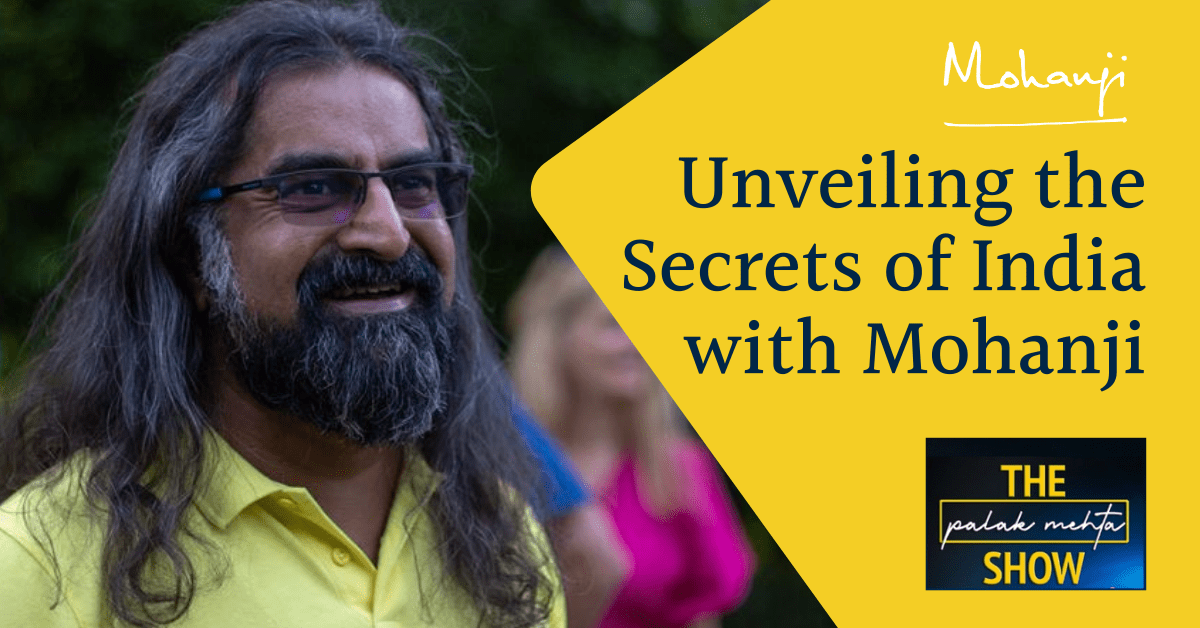A true teacher is simply a mirror and if he or she is also a leader, you have hit a jackpot. India is a land of such powerful leaders and today, I’m going to be speaking to one of them.
I am your host Palak and I welcome you to the very first episode of the Palak Mehta Show. Presenting our first guest- Sri Mohanji.
WHO IS MOHANJI?
A Philanthropist, humanitarian, teacher, friend, a man next door and a globally renowned Spiritual Master – Sri Mohanji.
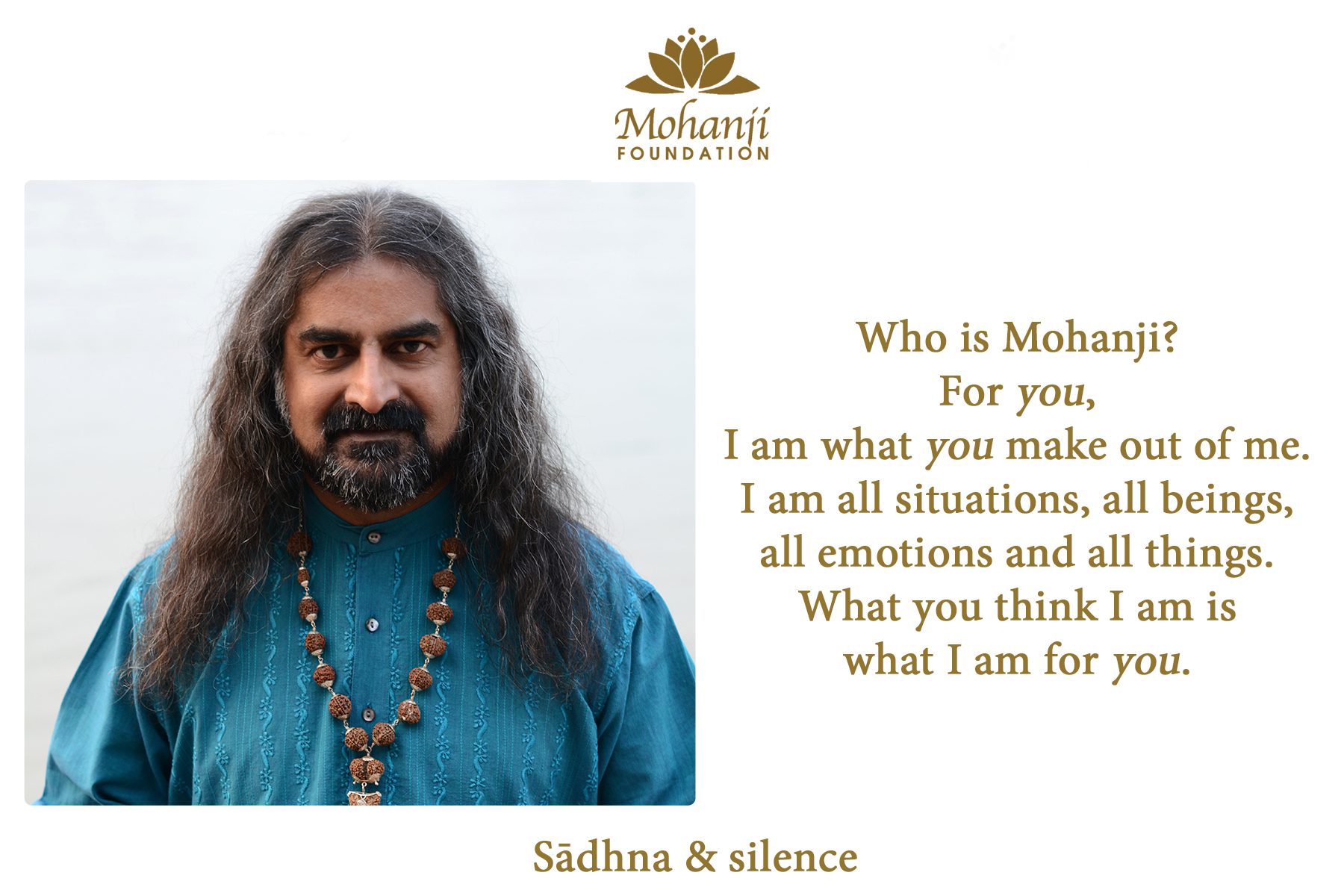
For some, he’s been a top shipping professional in the Middle East. For others – a dear friend in need. For many – he’s been a powerful Guru. A source of positivity and inspiration for karma yogis. Mohanji has founded several charity organizations and platforms worldwide such as the Mohanji Foundation – a platform for the building of healthier societies, registered in 15+ countries. ACT Foundation, a global charity platform. Mohanji Youth Club – a platform to empower and inspire teenagers. EBC -The early birds club, encouraging one to start their day at 4 am, and the World Consciousness Alliance – a unified platform for raising the vibration of humanity. The base of his approach is purity in thoughts, words, and actions, which lead to a liberated existence. Ahimsa, unconditional love, kindness, selflessness, compassion, righteousness, and the power of gratitude are key values that he wants to see with every person. Coexistence with and selfless service towards other species and Mother Earth should be our number one priority.
Palak: Namaste, Mohanji! Thank you so much for coming on this show. We are truly blessed.
Mohanji : Thank You.
Palak: Mohanji, my first question to you is: Who is a Hindu? Can anyone be a Hindu?
Mohanji: To answer it directly, Hinduism is not a religion. It’s a way of life. Anybody can be a Hindu, provided they are natural, they are themselves, they accept themselves totally, they are totally balanced in their outlook. They look at every being as part of themselves; they belong to the world and the world belongs to them. There is no greed, there is no anxiety, fear, there is no confusion, and there is total balance. If somebody has total balance, he can be called a Hindu. I do not think that this word ‘Hindu’ existed beyond a few hundred years. I believe that the name or the word Hindu or Hinduism is coined just to denote or just to talk about a few people who live on the south side of river Sindhu and are practicing various aspects of existence as they are. My firm belief is this. Hinduism is like an ocean. It’s not a religion; it is a way of life. And it is deeply rooted in how Nature operates the balance that Nature keeps. Nature has its own balance. Every being in Nature is fully rooted by the balance of Nature.
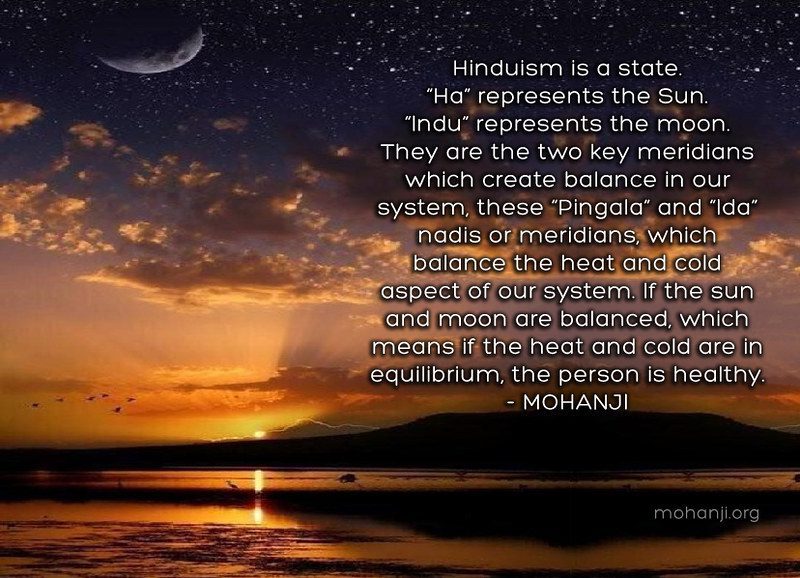
Like that, human beings as part of Nature should also be rooted in the aspects of Nature. A true Hindu will be totally peaceful. We will not be aggressive at all. Aggressive in a sense – not that we are not self-defensive, we will defend ourselves, that’s a different story. But, a true Hindu is somebody who nourishes and nurtures. A person who would contribute to the growth of everything around him and who will not contradict. Who will not be against things. But instead, through deep acceptance and deep nurturing, you will develop yourself and you will nurture the whole life around you. This is how a true Hindu can live.
So, it does not matter which segment you are born in. But internally, you can be a Hindu when you are balanced. ‘H’ which is the Sun and ‘Indu’, the Moon, the Sun and the Moon, the heat and the cold, the male and the female in us unite perfectly – it gives us a balance. That balance makes you a Hindu.
Palak: What is so special about this land called Bharat?
Mohanji: This land has the Bharat; Bha-ra-ta; Bha – has that bhav, feeling, the various feelings, and various aspects, dimensions. Ra– is the music, the Om, the vibration, the frequency. Ta is the rhythm. All this merges here in this land. And this merging of the Bha-Ra-Ta together makes the person connect to himself. In your own body, there is Bhav: there are various feelings, various expressions, and various experiences, the room for tackling and experiencing various aspects of life. Then the rhythm, the movement of the rhythm. It’s like music. Like a medley. Each organ functions in a synchronized way, the synchronicity of functioning. And the Ta – the rhythm – basic rhythm, heartbeat. When this is all combined, we have a good healthy life. So, Bharat is the space where this aspect of existence, when everything is harmonious when all things are united – you have a good life.
Palak: Thank you so much. In that sense, isn’t Hinduism less of a religion and more of spiritual ideology?
Mohanji: There have been great Masters who totally connected to themselves and they became the Universe by focusing on themselves, finding themselves inside, and settling themselves inside. This is the place where we have seen tremendous great Masters, consistently – over every period of time, over every generation. This has helped this country, unique country, and unique space on Earth.
Palak: What is Purushartha, can you explain it in a little bit more in detail?
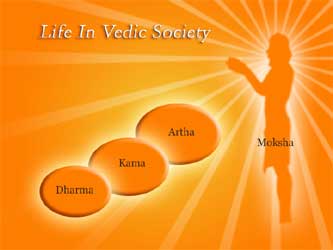
Mohanji: The key aspect of human existence is called Purushartha. Purushartha has four aspects: dharma, artha, kama, and moksha. Dharma is righteous living, the right way to live, righteousness. Artha is material support, including your bed, your clothes, your space or your house, or your food. Artha is a very broad thing, every material that supports your existence. Kama is the desire, the hope, the inspiration, and the tendencies. This is Kama; and Moksha – liberation. That means, while you are experiencing anything, you already know inside, that these are all temporary. Nothing stays forever. We are here on Earth like a tourist, with a duration of space of existence from birth to death.
Then we have to leave, at some point in time. So, with that full awareness, that we are existing in liberation, while we are experiencing everything, that is the right way to experience. Not through ownership and a false illusory feeling that we own these things. We cannot own land, we cannot own relationships, and we cannot own wealth forever. For some time you can be custodians of all this, but you cannot own them forever. The Earth owns us. We go away at the time of our death, which means we need to shed the body. So, this Purushartha is well dissected, well defined, and well-practiced here. This is very important. Every other place had Dharma: laws, rules, social laws, social rules and guidelines, and all those things. Artha – materials, welfare, material support, that was there. Kama – of course inclination, and desires which caused all developments. But, Moksha – the detachment aspect is defined only here. And that makes us unique, and that brings all the people to India. In search of this, how can you live detached amidst everything?
Palak: I always wondered Mohanji, is there a spiritual significance to the whole Indian attire?
Mohanji: The spiritual significance is basically what is comfortable for you in the space you exist. In a tropical climate, in a tropical place where there is humidity, much more humidity, like 90% humidity, if you have to wear a shirt and jacket, it does not suit you, because that is not suitable for the environment. So, our attires are all connected, like each segment. India has great diverse locations. Every place has its flavor, its own cuisine, its own food habits, its own climate, and attire. Everything is different. That is all based on the conditions of these places. And I think that is the right way to do it.
Palak: How about the spiritual significance of the beard? A lot of men, back in the day, in ancient India, would grow their beards and even their hair. Especially a lot of people who follow spirituality. Is there a proper scientific or spiritual reason for this?
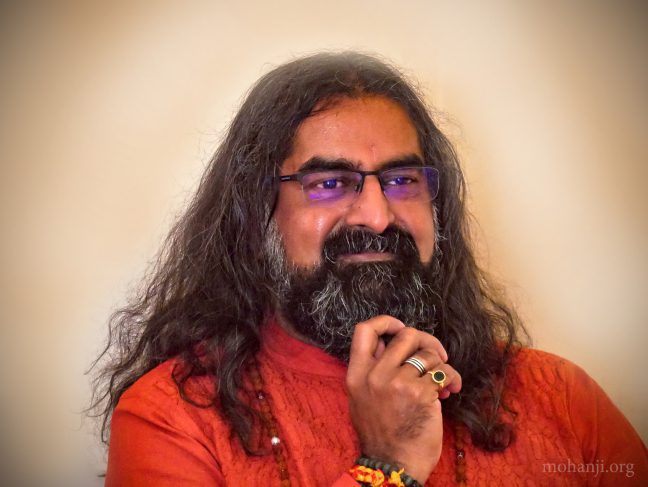
Mohanji: In ancient times, the idea of being natural also meant that they have long hair etc. And if you are talking about the Saints and the people living in the Himalayas etc., there is no way they could go to see a barber quite easily. There were no barbers to attend to them. But most importantly, now it is scientifically proved also, when you allow your body and hair to be natural, you are more connected to your awareness. You are more aware of yourself. Awareness is fundamental that you should have. And in the practice of awareness, you should be fully aware of yourself. When you are unnatural, then slightly, in a subtle way, it disturbs that energy flow.
Palak: Mohanji, what do you think about traditional Indian art forms? Do they hold any spiritual significance?
Mohanji: I love it. I love the Indian art forms and numerous varieties. Every state has its own. And they are all rooted in Sanatana dharma, the eternal ground rules, or perpetual ground rules of Existence, means – how Nature is. We have picked them up from Nature and we have practiced them over time. Everything is harmonious. Something which creates harmony inside and outside, this is the beauty of most of our art forms. Our various deities and our various festivals, they all have this aspect, the harmony aspect. Whether people know about it or not, over a period of time everything changes. Evolution happens in everything. We may not know the real philosophy behind everything. For example, why do we worship the basil plant – Tulsi, people may not know. Tulsi plant is one of the plants which has an aura eighteen times its size, which people have said. This is in the scriptures. That is why something which has a great aura is respected. Means, a person who has great aura is a saint. He is respected. Like that, the plant is respected because of the size of its aura. Every philosophy has a deep root. There is a meaning and a method; there is a reason, proper reason. Everything is coming towards or aligning to alignment, personal alignment, harmony. So, all these festivals, all these art forms, everything are expressions of, spontaneous expressions of personal harmony. That is why I love them.
They are not just something that will break up your emotions and just make you unconscious, or to just follow something without knowing. Not that it takes you to a level of unconsciousness. Instead, it takes you to a level of full consciousness. That is liberating, right? When something you can connect to, or something connects to you, it evokes in you a level of consciousness, higher consciousness, and that is beautiful. That is why I love it. I think that there should be a lot more explanations and kind of details to be given to people so that they can start experiencing them.
Palak: India is known to gift the world with a sattvic lifestyle. How is that related to animal cruelty?
Mohanji: If your aim is for higher awareness, if your aim is liberation, if you aim to meet and merge with higher consciousness, then consumption should be disciplined. Discipline is very necessary for elevation to a higher level, not that we are not all going to be saints or going to be liberated, so any food is fine. I always say – avoid violence in thoughts, words, and actions. So that you will be feeling good, feeling peaceful. Violence breeds guilt, regrets. These are non-essential things, they just imbalance you. Avoid imbalance and be harmonious. That is your birthright. That gives you peace of mind. You can sleep peacefully.
If you cheat, steal, betray, talk bad, take revenge, character assassinate, you won’t be able to sleep peacefully, because your mind will be contaminated. Just like that, food which has violence behind it, if you consume unconsciously, the body becomes numb. And the essence of that violence enters your system. That you realize, when all faculties are focused inside. Then you realize that every small thing counts.
Palak: Mohanji, in your opinion, what do you feel, is yoga being misunderstood globally?
Mohanji: I do not think that yoga is misunderstood. Yoga has been understood now more, and the value has been understood now. I think overall the awareness of yoga is much more than before. This is what I feel whenever I travel. Not only yoga, but also vastu, and ayurveda, our great wealth. Wealth is really the wealth of knowledge, which is being accepted and appreciated in the world outside. Our understanding of the plants, Nature has a part in our existence. Then the contribution of the birds, the animals, the harmony of humans with other species. I think there is a lot more awareness of all these things in the world. Some people have come and discussed these things with me. In case if there is a misunderstanding, I think this is very temporary or in a small segment. But on a large level, I think the understanding is much more. This is what I feel.
Palak: Mohanji, has the Indian system of schooling evolved over the years?
Mohanji: The Indian concept of schooling has not grown over the years. This is my feeling. The Gurukul system was completely connected to a person’s inclinations – vasanas. A person who has a tendency, vasana towards let’s say science is taught scientific things. A person who has inclinations toward spirituality is taught that subject. If a person who has an inclination towards let’s say – martial arts or archery, or war techniques, that is what he is taught. If you look at the epics of the past, you will know how the education system happened.
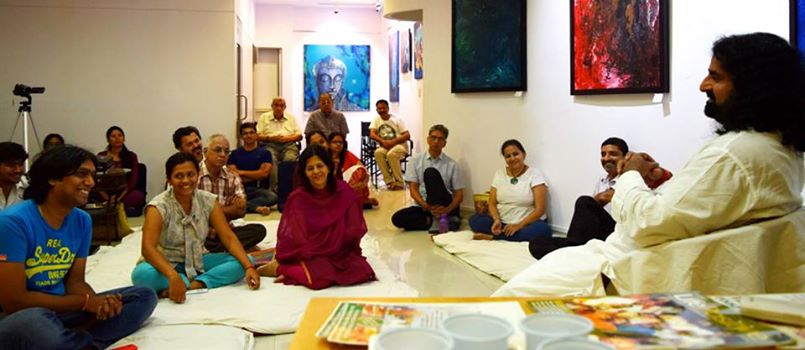
The Master looked at the level of awareness of each individual, each student, and delivered accordingly. That means it was individualistic. No denial. This individualistic approach is very important. In a massive, in a kind of systematized educational system, we are creating just bricks on the wall, mediocrity. But in the Gurukul system, there cannot be mediocrity, the student learns based on what he is capable of. What his inclinations are. So, he will be happy to learn it. Learning should be a pleasure, not pressure. In the modern educational system, the main disharmony I find is that students are learning things to make money, to make a living. So, what do they learn? Most of them learn what provides them a job, which will give them a lot of money instantaneously. Meaning, as early as possible. People are only going for safe subjects. But their inclination or their attitude may be different. But, in the Gurukul system, attitude is counted very deeply. And the Master knows. Like for example, if you see how Drona used to teach his students. He decided that each one of them was taught according to his attitude, his disposition, and his caliber, what he was capable of. And it is important that he will not use it for selfish pleasures. For the sake of dharma, not adharma, that was decided. There should be a total balance inside before a martial art is taught. That means it should be only used for self-defense. Not for attacking. Not for abuse. It should not be abuse. When a person decides to use it, to show his pride or for egoistic purposes, it’s taken away because nothing is taught for egoistic display. Instead, it is taught for self-defense. This is how our system worked earlier.
It was beautiful, harmonious. A person who likes carpentry is taught carpentry; a person who likes cobbler work is taught cobbler work. Things like that. Based on what his disposition is, he is taught that. That system should come back. We should educate people based on their disposition, attitude, and also their capacity and caliber. So that everybody will be peaceful. When you have people performing life or performing their duties in life, if they are taught things that are suitable for them, they will have a balanced existence. They’ll be happy to do it. Work will be a pleasure. Now work is usually a pressure, for the sake of money. The internal harmony is missing. We must get this back. Life has to be harmonious. I believe so. If you do not like something in life and you are pressured to do it, the whole life is disturbed. And that is displayed as aberrations. People go for intoxications, strange behaviors, sometimes abnormalities in behavior, sometimes perversions. All these things are connected to disharmony.
When a person is totally harmonious, they will not display anything disharmonious in life, which means they will not display any aberrations in life. I think that we have to bring back the old system of education; where we are teaching children based on their attitude. I think some schools are doing it, but not all schools. So instead of churning out like a machine, more and more bricks on the wall, we should instead concentrate on bringing out the best of every student. That will make every student competent, confident. They will not have to compete with anybody.
Why do you have to compete with anybody? Because you are trying to find your footing somewhere. If you are satisfied and stable with your skills, then what are you competing with? You are unique. And what you are displaying with your right skills, right mechanism, or the right education? What you are displaying is the right product, the right attitude in society. When you display the right attitude in society, you are rewarded the right way.

Glory happens when you are harmonious with your tendencies, your inclinations, and you are doing things which suit you. When you do things which suit you, you are happy with it. If your activity is a pleasure for you, you will be successful; you will have glory because you love to do it. You really love to do it. When more people do things which they love to do, the world is better. This should come back. India should get this back.
Palak: How to bring peaceful societies around the globe? Do you think a Gurukul system could help?
Mohanji: I would always say, let there be harmony in every aspect of existence, and then there will be harmony in the society. Now you can see a lot of aberrations, so much of heartache. We see disturbances. The root cause of these disturbances is that people are not happy. They are doing things for a living. But they are not happy. If they are happy, they will not disturb any other soul, any other being. They will be peaceful. To bring this peacefulness we must bring harmony. And that has to go in every aspect of existence. I always believe that there should be counseling in every level, from the small class to all the way to the highest class. Whichever class people go into for education, there should be counseling. People should be able to talk, “This subject is not suitable for me, and I can’t do this.” So that you never ask a fish to climb a tree and call it a failure, because fish can’t climb trees, fish is not supposed to do that, it is supposed to swim well. So, we will give that aid and ability for people based on their disposition, their inclinations, tendencies, attitude. Then there will be a great life.
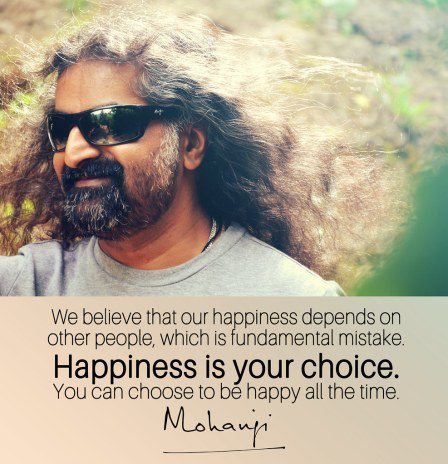
Palak: Mohanji, I follow you on twitter. And in a recent post, you mentioned that Nikola Tesla, Bob Marley and Bruce Lee are saints on their own right. That is a very unique perspective. Please shed some light on that.
Mohanji: I respect all these people, like Bob Marley and Nikola Tesla because there are certain aspects which makes you a saint. One of the key aspects is that you can have anything you like because you are resourceful, but you want nothing. Means total detachment. You can have plenty, but if you don’t need anything, you are not connected to any aspect of your existence outside of you. Instead, you are fully connected to every aspect of existence inside you, you are a saint.
You can be a musician, you can be a pilot, you can be a scientist, it does not matter, but how detached you are makes you a saint. We had a great president A.P.J. Abdul Kalam, he was a saint – walking, talking saint. He was living the life of a saint. When he left his body, he just left behind the dress he used and a few pennies. That is it. He was the president of the country but he never amassed wealth. This greed for things from Earth and the greed for positions and possessions, they all make you terrestrial. But here, you can have anything you like in the world, because you are resourceful, you have talents, but you are not affected by anything, means – you don’t want anything.
When Karl Marx introduced the concept of haves and have nots, it really inspired the world. And that is how communism took birth. But there was one category of people at that time, and even now, and before that time, who could have had anything they want but they needed nothing, the great Masters. They were fully occupied with the bliss inside. They were really floating in that place, fully occupied, enjoying the bliss. They wanted nothing from this Earth. This class is the real class, totally detached from everything. Detached from everything, but enjoying everything. If something comes to them, they enjoy it.
If it does not come to them, fine. So there is no regret, there is no guilt, there is no desire, there is no ambition on that level. Just living their life, free as a bird. Complete freedom. So, a person living in total freedom without any materials, like intoxications, etc., on their own – can be considered a saint. This is real sainthood. Real sainthood is total detachment, while you have everything. Not that you don’t have it and you say, “I don’t need it”, that is different. But while you have everything, while you can have everything, but you don’t need anything, that is sainthood. That is a real saint.
Palak: Describe India in three words?
Mohanji: Bha- ra- ta.
Palak: Who is your favorite Bollywood actor?
Mohanji: Amitabh Bachchan.
Palak: You started speaking a little bit of Hindi, what is your current favourite Hindi dialogue?
Mohanji: Speaks in Hindi
Palak: Mohanji, what is your vision for India in the next 20 years?
Mohanji: Total love. Total coexistence with harmony.
Palak: What is that one thing which this pandemic has given birth to?
Mohanji: Yourself.
Palak: Alright, this is an easy one. Most of us know the answer, but we still want to hear it from you -Mountains or beaches?
Mohanji: Mountains.
Palak: If a feature film is made on the life of a saint, who would it be?
Mohanji: Swami Vivekananda.
Palak: Thank you so much, dear Mohanji, from the bottom of our hearts for taking this time. And I’m sure that our viewers have not had enough of you. We will be calling you again next time, and we were truly honored to have you.
Mohanji: Thank you so much. I wish you great success. This is your first show. I’m sure you will do very well. And there will be a great, great presence of you and your shows in the world. And the world needs it. You have the caliber, you have the talent, and you will be visible. Shine bright, the world needs light!
Palak: Thank you so much.
Mohanji: Thank you.
Palak: Thank you so much for watching. If you like this show, subscribe and share. I’ll see you next time with another very special guest.
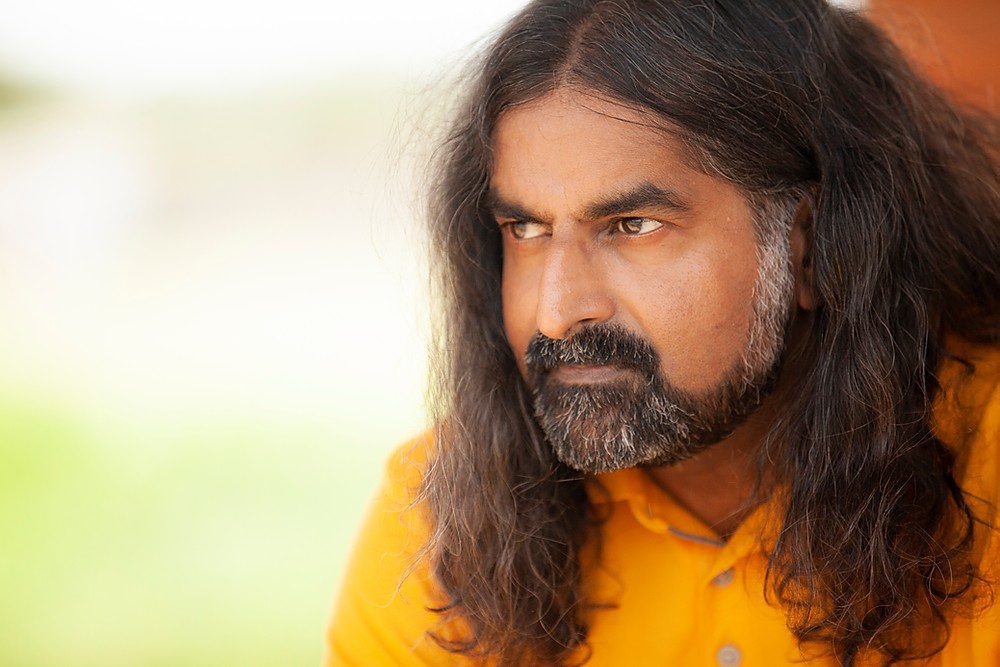
Transcribed by Nada Rakovic
Proofread by Shyama Jeyaseelan

